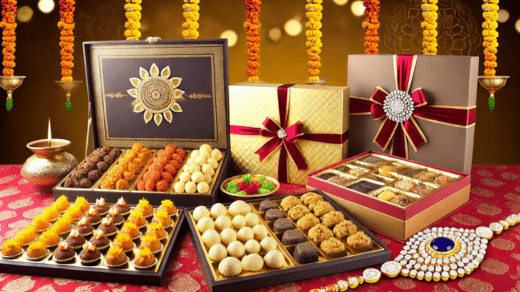The Cultural Significance Of Indian Sweets

diwali sweets for corporate gifting, gift hamper for raksha bandhan, diamond rakhi
Discover interesting Indian sweets. Enjoy fragrant spices and ethnic foods while learning about India’s rich culinary heritage. Get ready to savor various flavors as you discover the symbolic meaning of these sweets—celebration, good fortune, and unity—inside their many uses. You can buy any of these Indian sweets from Ghasitaram as diwali sweets for corporate gifting purpose.
Celebratory Occasions
● Sweets as a symbol of good luck
Indian festivals include sweets, which are considered to bring luck. Giving sweets at weddings, celebrations, etc., is believed to bring luck and money to the celebrant and their family. Sweets are eaten and shown to promote joy and luck this time of year.
● Sweets in weddings and festivals
Indulge in a delectable assortment of sweets at any Indian wedding or occasion. Holidays are special times for families to gather and enjoy; treats are a great way to get everyone in the holiday spirit. Delicious snacks make everyone smile at weddings and holidays like Raksha Bandhan and Navratri, where guests trade sweets.
● Sweets as gifts and gestures of hospitality
Guests are welcomed with sweets as a sign of hospitality and kindness in Indian culture. A box of mixed candies is a traditional gift to offer to any social event or when hosting guests at one’s house. In addition to highlighting the host’s generosity, this ritual sweetens social interactions and helps people feel more connected. Send a box full of Indian sweets from Ghasitaram with a gift hamper for raksha bandhan to your brother.
Symbolism and Tradition
● Sweets in auspicious rituals
Sweets are symbolic of many of these joyous events and are firmly ingrained in Indian culture. Sweets are commonly served at weddings, baby showers, and religious holidays. Desserts are considered to bring luck, blessings, and money.
● Sweets as a gesture of love and respect
Indians cherish sweets as a sign of affection and respect. Gifting a box of someone’s favorite candy is a way to show gratitude and establish ties with friends, neighbors, and older relatives. Giving sweets to someone shows how sweet the bond is and how much you want to make them happy.
● Sweets as a representation of wealth and prosperity
In Indian culture, sweets are frequently linked to affluence and success. Traditional sweets’ use of costly ingredients like saffron and nuts, together with the time and effort put into their preparation, symbolize the wealth and richness that families strive for. People believe that by eating and sharing these candies, they will bring luck and wealth into their lives. You can also send these sweets from Ghasitaram in Rakhi with a diamond rakhi to your brother.
Conclusion
Indian desserts have a vast cultural, historical, and culinary significance. Eat these delicious dishes to experience the rich flavors and traditions that make this country unique. Indian sweets have always been part of various cultures’ festivities and religious observances, and this practice has grown. They are essential to Indian food and culture because of their versatility, artistic value, and health benefits.



